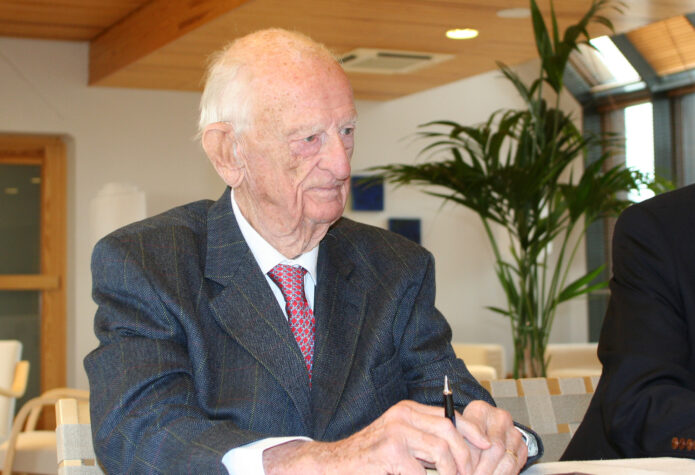Haldor Topsøe: Make science earn money

Success in a catalyst business is all about fundamental research. It’s the science that earns money, says Dr Haldor Topsøe, chairman of Haldor Topsøe A/S, which has signed a loan agreement with NIB to finance a new investment in R&D. His advice to political leaders is very much in line with the above: take your time and research to understand the world better. The 99-year-old doyen of the Danish business community has given an interview to the NIB Newsletter.
Your company has signed a loan agreement with NIB totalling DKK 250 million. What are you planning to achieve in the new investment programme?
“Research and technology development require large investments, because there are so many things you want to investigate and understand better. Our company spends about DKK 400 million every year to support technology development. We have plans to expand our own R&D division, invest in new equipment, and expand the cooperation with research groups abroad. We are constantly in touch with research bases in Scandinavian universities. This network is expanding to other European countries, Far East, Russia, the US, South America and many other places.”
You said in an interview you are keen on creating new knowledge. How important is this in the new R&D investment?
“Creating of new knowledge is always paramount. Very few processes are being conducted in the same way and for the same purposes—using the same unchanged knowledge—as five or ten years ago. If we hadn’t had prioritised creation of new knowledge, many of the technologies we are now using wouldn’t exist. If you want your business to be competitive and survive anything that may happen on the market, you have to base your operations on fundamental research. You can’t lose, because everything that is created now or will be created in the future is based on fundamental research.”
Why did you decide to cooperate with NIB in this project?
“One reason is historical. I’ve been involved with NIB ever since it was started. I participated in discussions on NIB prior to when the Bank was established. Another reason is that NIB’s philosophy and experience fits what we want to achieve. In my opinion, we, NIB and ourselves, think alike. I believe this was true when NIB began its activities, when we had our first arrangement with NIB back in 1995, and it is still true today. It had no meaning to have relations with a bank like NIB if we were miles apart in our philosophies.”
How has your company become a global leader in catalyst production?
“You wouldn’t find an industry that doesn’t somehow depend on catalysis. Without catalysis there would be no life on earth. Even sun rays can do very little without basic photosynthesis to help create life. We were a small group of people interested in theoretical physics and theoretical chemistry, so we decided to start a business to amalgamate our passion for research into something useful. Since then our company has focused on fundamental and applied research that could luckily be combined with and financed by selling catalysts and catalysis-based technologies for industries. In other words, we found a way how to make science earn money. I can say today that the hope we cherished back in the 1940s when started the business has come true.”
How important is the environmental component in your operations?
“We are developing catalysts that reduce harmful content, such as NOx and SO2, in exhaust to the atmosphere. Each step in the value chain from the generation of energy all the way to the production of heat or manufacturing goods, which is a sequence of catalytic steps, create exhaust that needs to be purified — again through catalysis. Catalytic processes can be combined with other approaches in order to remove not only obnoxious products from the exhaust, but also particles, and reduce the impact of vibration, noise and so on.”
How does one encourage innovation in a company?
“Some hope they can manage innovation. I don’t believe that. It is very much a situation of having colleagues who think alike and want to create something new. It is crucial for any company to have employees who are motivated by ideas and plans. I don’t know how to achieve that, unless you have a place where people like to work.”
You established your company 72 years ago and you are still at the head of it. What is your vision for your company for the years to come?
“To grow.”
You are 99 years old. People retire from active work life at much earlier ages, what is your formula of endurance?
“I have no personal recipe. I’ve always considered it a privilege that I still can work and I am grateful for the way my colleagues in the company treat me, for the opportunities I have to participate in planning and discussing the future of the company as well as discussing, on a large scale, how we in the Nordic countries can create a good future for people.”
This echoes what you once said about business having little meaning if it doesn’t improve people’s lives and help poor countries. What is your idea of a responsible corporate citizen?
“The real thing about social responsibility is to help people have a decent life. Therefore the wealthy should focus on helping the poor more than anything else. There are millions of street children in many different countries and we don’t see how the world can be a good place to live if millions of street children live in extreme poverty. Ever since we established the company 72 years ago, we have considered helping street children as one of the best ways of combating poverty. But we are modest enough to understand that however large we think our contribution is, it’s just a pittance compared to what’s needed to help street children in the world.”
Looking at the big picture throughout history, from one crisis to another, from war to war, do you think the world is becoming better or worse off?
“I think political leaders need to work hard at formulating long-term views, not only focusing the next elections. For long-term views they have to do their research. They need to understand global processes. Like we in our business, they also need to widen our horizons. I even wrote a book 15 years ago that discussed the role of knowledge in modern society. As to the uneasy situation we are in, there has to be a balance between financial austerity, which will create an awful lot of social problems, and investing, which will create temporary financial problems. Slashing budgets is simply not enough. You should always be on the lookout for an opportunity to create something new.”
